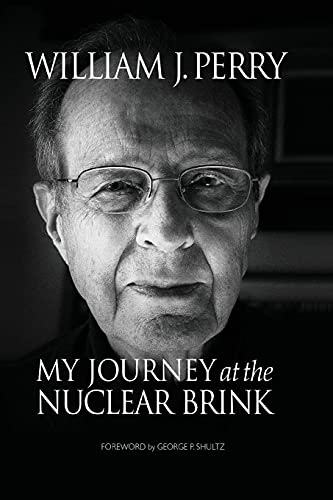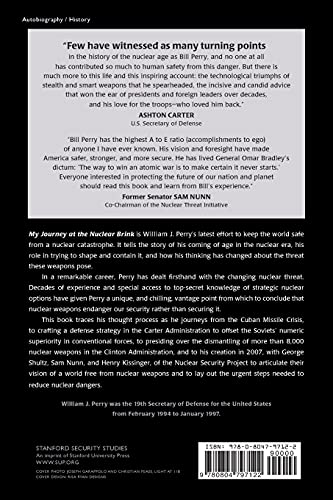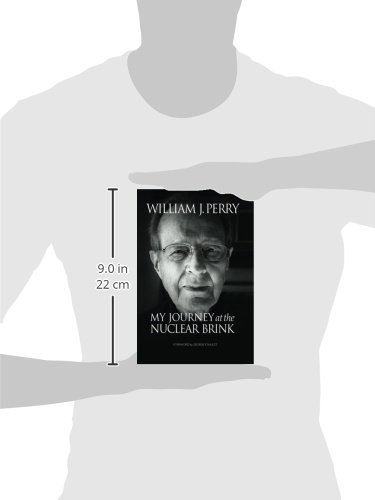Customer Services
Copyright © 2025 Desertcart Holdings Limited




My Journey at the Nuclear Brink
F**E
The first step
In this book, Perry devotes a chapter, entitled "The Fall of Security Ties with Russia," to the deterioration of US-Russia foreign relations after the collapse of the Soviet Union. He prefaces the chapter with George Kennan's famous characterization of NATO expansion eastwards towards Russia:"I think it [NATO expansion] is the beginning of a new Cold War. I think the Russians will gradually react quite adversely and it will affect their policies. I think it is a tragic mistake."Then, throughout the chapter, Perry offers up the following prescient observations:"Russia considered the expansions of NATO underway in 1997–99 a threat, and they regarded the later inclusion of the Baltic States as “marching the NATO threat up to their border.” In what was less than enlightened conduct, the United States and NATO generally acted as if Russia’s concerns were inconsequential. Particularly galling to Russians were NATO’s actions in Kosovo, in the deployment of a ballistic missile defense (BMD) in Europe, and in the continuation of NATO expansion, including the Baltic states, which had been a part of the czar’s Russia and, for a few decades, the Soviet Union. Subsequently, NATO started the early processing of Georgia and Ukraine for NATO membership. Now Russia distanced itself even further from NATO and showed increased resentment of the US, believing that the US displayed no regard for Russian feelings and interests, concluding that we would do whatever suited us best, leaving Russia to cope as best it could. ... Could we have reached an agreement with Russia that protected the Kosovars? We don’t know, but I don’t think NATO tried very hard. NATO knew that the Russians could not stop their incursion into Kosovo and decided it would be done in spite of Russian concerns. However, the Russians could and did build a resentment that would manifest itself in later actions. ... [W]hen the George W. Bush administration withdrew the US from the ABM treaty with the Russians in order to deploy a BMD system in Eastern Europe directed against Iranian missiles, grave tensions with Russia built up. ... [In 2014, after] Ukrainian president, Viktor Yanukovych, was overthrown by demonstrators in Maidan Square in Kiev, Putin [annexed Crimea] and supported a break-off of the largely Russian-speaking provinces in Eastern Ukraine, at first using thinly disguised Russian troops to support the local insurgents, and later not bothering with the disguise. ... The story I have related is sad, if not tragic. It is a parable of how quickly relations can sour, and how much damage can be done when two powerful nations operate in opposition to each other. In less than fifteen years the relations between the United States and Russia went from positive to an all-time low. It is particularly sad when one believes, as I do, that we had the opportunity in the 1990s to build a long-lasting cooperative relationship with Russia. The descent down the slippery slope began, I believe, with the premature NATO expansion, and I soon came to believe that the downsides of early NATO membership for Eastern European nations were even worse than I had feared. ... There is no question that actions by the Russian government have contributed to these sad results; and certainly, NATO expansion did not by itself cause them. But NATO expansion was the first step. Again, following that decision there occurred the series of other American and NATO actions that Russia found threatening: most prominently, the American deployment of BMD systems in Europe, the NATO military action against Serbia, and the proposal to offer NATO membership to Ukraine and Georgia. No one of these was decisive; but together they were interpreted by Russia as a sign of disrespect for Russia’s interests—a sign that the United States did not see Russia’s views as important. It is a troubling turn of affairs that has the potential of becoming very dangerous."To rephrase Perry's observations in light of subsequent developments: Could Joe Biden, Secretary of State Tony Blinken, and NATO have reached an agreement with Russia in 2021 that would have satisfied Russian security concerns by requiring Ukrainian and Georgian neutrality while preserving their sovereignty? We don’t know, but Biden, Blinken, and NATO certainly don't seem to have tried very hard. The Biden administration and NATO, in what was less than enlightened conduct, simply assumed that Russia could not stop the expansion of NATO to Ukraine and Georgia and decided it would be done in spite of Russian concerns. There is no question that Vladimir Putin gave the order to invade Ukraine in the spring of last year and is responsible for all the devastation the people of that country are now suffering. But American intransigence and disregard for Russian security concerns about NATO expansion was the first step down the road to this tragic war.
E**E
Mr. Perry, write a better book! Please.
Disappointed. My disappointment lies in a comparison to other authors on the subject. None of those authors having held such a high office of public service and all that means. Little in the book was revealing insight on policy making or "brinksmanship". As Secretary of Defense (SecDef), Deputy SecDef and Under SecDef, Mr. Perry either self-imposed limits on what he felt he could say or was limited (hamstrung) by the nature of his past and the terms of non-disclousure agreements resultant from him holding the highest security clearances.I'm sure it felt good to publish a book he may hope will make a difference, but what difference? I'm left wondering... I took away a since of the author's pride in his work on Nunn-Lugar and of the friendships he made with his peers in other lands and that we are country again exposed to an escalation of international tensions related to nuclear weapons. But I find nothing actionable, nothing enlightens me about the past, from which we can materially learn and apply to future. And this work comes from a man that had the need-to-know, had the exposure to the technologies and understands the technologies possilby better than most persons, past or present that served as SecDef.The subject of National Security, nuclear proliforation and the command and control of nuclear forces is of renewed interest in the light of Trump's bombastic, inflamatory and irresponsible public rhetoric. The deteriorated state of our services oversight and maintenance of their resources, including material and protocols is disconcerting to say the least. For heavens sake, pot smoking missile men, transportation of nuclear weapons without knowing they were nukes, and Navy combat ships at sea running into other ships. JEEEZ! Mr. Secretary tell us your thoughts on how to fix these institutions.The Nov 2017 Senate Foreign Relations Committee, in open session discussed grave concerns about Presidential control of nuclear forces. We need a lot more of those types of discussions and men like Perry speaking from a perspective of and a former insider not a whistle blower.I hoped, Mr. Perry's roles in the Office of Secretary of Defense and willingness to approach the subject of nuclear weapons in the open, would have provided profound insights and revelations into what has happened in past and how we may work to manage effectively the future.I cannot help but compare this work to Daniel Ellsberg's recent book. Although Ellsberg's concentration is heavily based in the late 50's and early sixty's and I don't necessarily agree with his politics on whistle blowers. One need not be a Snowden...but one can be a Borrows or Richelson and responsibly write meaningful works without compromise of real national secrets. Especially when the secrecy of National Security issues are historically along the lines of "protecting" the policy makers and leadership from revelations of the flaws and weaknesses in the systems meant to protect this great country.Nuclear weapons and all the systems supporting them, from intelligence means and methods to the front line men and women who would ultimately pull the trigger have inherent need for a degree of secrecy... which weapon is targeted on which target...certain technical design features of systems and the communications amongst leaders and subordinates and nuclear weapons release codes need to be secure.However, on the extremes of policy... declaration of "no first use" is as silly as the proposition the proportion of massive retaliation...these subjects warrant discussion of why and constant debate in the context of the dynamic and dangerous world we now face. Soundbites and social media are all much the only means many young people get their news, form opinion and remain profoundly ignorant of the real world.The responsible open discussion of arms control and the management of nuclear forces requires public debate and disclosure. Lead by our elder statesmen and the men and women that have lived the history. Only through this discourse can we education the next generations who are at risk of being held hostage to their ignorance and thus doomed to failure. We need men who have served this country in positions which exposed them to the foibles of mankind and author/scholars to share responsibly their experiences with the management and operations of nuclear weapons and thus, hopefully ameliorate the some of the risks we face in future. Cuz the bomb ain't goin' away anytime soon.
R**M
Excellent read
Excellent read well and it's worth taking a look at this troubling subject ... As the world gets more dangerous or appears too it's interesting how we are protected ....
J**M
Nuclear Nightmares
Very good and timely reminder of the huge risks associated with nuclear weapons.
S**!
A most serious danger and how to deal with it
In this selective memoir of his career in- and outside government, Perry describes his activities related to reducing the likelihood of nuclear weapons being used again. He explains why nuclear weapons pose an unprecedented threat to civilisation itself and outlines a practical strategy for dealing effectively and responsibly with this danger.The book reads mostly like a bureaucratic report but, given the significance of its subject matter and the authoritative quality of Perry's treatment, it should be read by eveyone concerned with humankind's future.
L**A
Livre d'importance
Livre d'importance fondamentale puisque, grâce au profil de l'auteur et de sa carrière, et donc de son exceptionnelle connaissance directe du sujet, permet de prendre conscience du fait que le risque actuel d'une guerre nucléaire est certainement au moins aussi grand que dans les pires moments de la Guerre froide.Livre que tout le monde devrait lire : cela permettrait de déconstruire des très dangereuses idées reçues chez beaucoup de personnes, à commencer par les "responsables" politiques !!!Dommage qu'il ne soit pas (encore) traduit en Français ...
Trustpilot
2 months ago
2 weeks ago